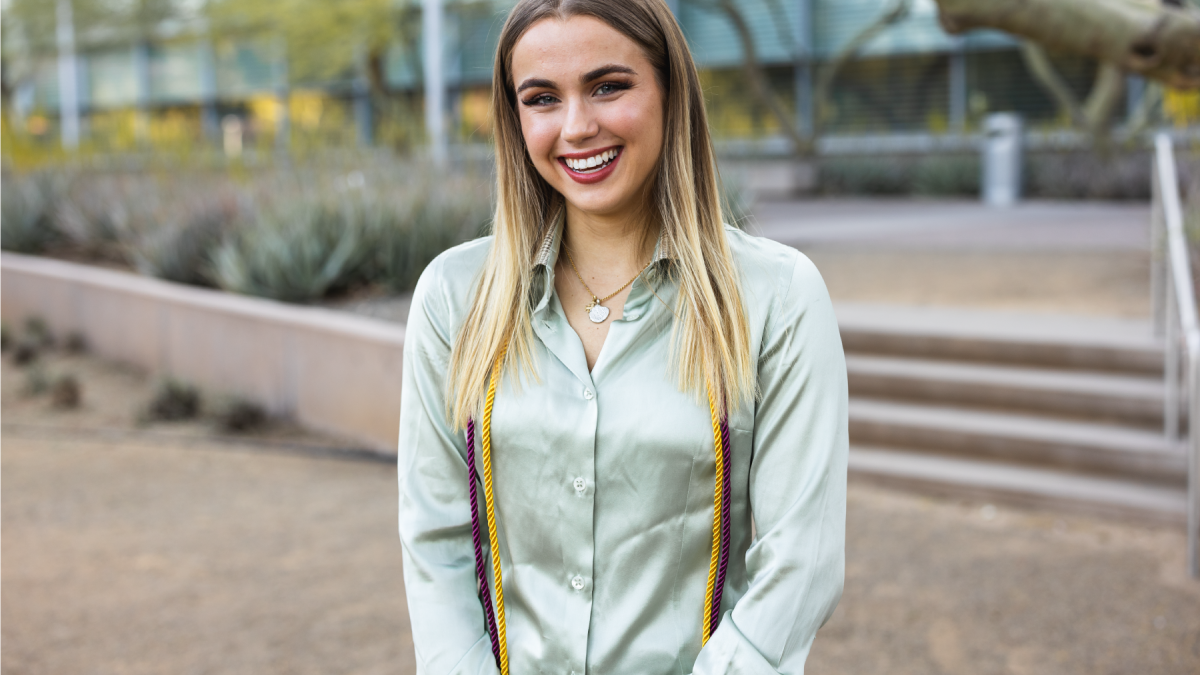Editor's note: This story is part of a series of profiles of notable spring 2022 graduates.
Theresa DeConcini has been named The College of Liberal Arts and Sciences spring 2022 Dean’s Medalist for the School of Politics and Global Studies and will graduate this May with a Bachelor of Arts in global studies and a minor in Spanish.
A Virginia native who lived in Tucson, Arizona, as a high school student, DeConcini always envisioned returning to the East Coast to attend college. However, when she was named an alternate for a prestigious scholarship that would have financed her top-choice school, she began considering in-state options.
For DeConcini, choosing Arizona State University was originally a financial decision. In hindsight, she says it provided her a community to be deeply connected to and a wealth of opportunity without financial burden.
“Given the chance to choose again, ASU would be my first choice,” DeConcini said. “Indeed, it was the only school I applied to for grad school.”
It was the first day of high school, in her AP Human Geography class, that DeConcini first became interested in topics related to global studies. Before graduating high school, she would spend a summer living in the rural Andes region of Ecuador.
“As I was walking back home after an impactful discussion with one of the moms in my host community about the challenges that indigenous, subsistence agricultural communities (like that one) face in a world of unsustainable, industrialized food systems, I decided that I would pursue a degree in international relations/global studies.”
While at ASU, DeConcini took advantage of multiple opportunities available to her ranging from local internships, studying abroad and assisting faculty with research.
During her first semester with the School of Politics and Global Studies, DeConcini took Assistant Professor Glenn Sheriff’s “Globalization and the Environment” course. To her surprise, the environmental economics class inspired DeConcini and helped her identify long term research interests in international and environmental policymaking.
The next semester, she worked with Sheriff on research through the Junior Fellows Program.
“Working with Dr. Sheriff was a humbling and impactful experience for me,” DeConcini said. “It was my first introduction to formal research, the world of academia, and massively influential for my thesis.”
“It was through this fellowship that I learned about air quality monitoring networks, how systemic socioeconomic discrimination appears in environmental policy, and the international conversation about environmental justice and the responsibilities of regulatory bodies,” she continued. “These topics would become the basis for my Honors Thesis and graduate research interests.”
In the fall of 2021, she spent the semester studying abroad at la Universidad de Alicante in Alicante, Spain. The experience, DeConcini said, better prepared her for a future career in international settings than any coursework could due to its “immersive nature.”
“Not only do I feel more confident in my ability to communicate with my international peers in a different language and country, but I feel excited to have similar international experiences in my future professional life,” she continued.
Her global studies education, DeConcini believed, gave her the tools and vocabulary necessary to excel while studying abroad.
“This served me well abroad because cross-cultural communication and evaluation were not only essential to my success in the classroom, and more so in my interactions with every person I met.”
Although she isn’t a political science major, DeConcini also pursued domestic and international politics opportunities during her time at ASU.
“I pursued my various internships and jobs because I felt that I had something to contribute and a vested interest in the issues at hand including informed voting, free and fair elections, representational democracy, nonprofit participation in the political system, and of course, the international implications of each.”
After graduating with her bachelors, DeConcini will be pursuing an master's degree in sustainability at ASU.
“One of the things I am most grateful to ASU for is its wealth of resources and opportunity,” DeConicini said. “I feel that ASU has well-prepared me to be a strong advocate for myself and those around me… This self-advocacy practice will give me the confidence to seek out opportunities and experience that truly fulfill me.”
We caught up with her to ask more about her time at Arizona State University.
Question: What’s something you learned while at ASU — in the classroom or otherwise — that surprised you or changed your perspective?
Answer: This is a great question and I could provide many examples of ways my perspective has changed while at ASU. However, one sticks out prominently in my mind. I come from a politically active family and from a community in Tucson, including my former high school, where people are personally invested in politics from the local to global levels. Our “household names” are political figures and “dinner table talk” follows the same themes. Of course, my peers in (the School of Politics and Global Studies) are also heavily invested in politics, so I felt comfortable with the coursework and classroom rapport.
While I was aware of this “bubble” in theory, I quickly realized that my perspective of world systems was unlike that of many of my peers at ASU. For the first time, I found myself having critical conversations with people whose world did not boil down to politics. This was refreshing and challenging. I had to learn how to explain my theories and opinions in a more interdisciplinary context.
Q: Which professor taught you the most important lesson while at ASU?
A: Dr. Glenn Sheriff taught me innumerable lessons while at ASU, and if I were to pick only one, I would say that reflection and honesty with yourself top the list of importance. I did not learn this lesson through a single lecture or meeting, but rather through the culmination of his instruction and mentorship. Knowing one’s limits and practicing professional boundary-setting in my academic and professional responsibilities is something I will continue to work on throughout my life and Dr. Sheriff undoubtedly helped me learn those skills.
Q: What’s the best piece of advice you’d give to those still in school?
A: While I don’t consider myself exceptionally qualified to advise others still in school, as I am still in school, I do think there is a lot to be said for taking everything with a grain of salt. Throughout our academic and professional careers, we receive endless amounts of solicited and unsolicited advice. I believe that seeking out this information is crucial, but knowing how to process and apply it is where success lies. Lots of advice is enlightening and lots is superfluous. While it will all help you gain perspective or broaden your horizons, it is ultimately your responsibility to choose how it affects your decisions.
Ultimately, you decide who you will be. Others’ experiences and takeaways may not always be applicable to your path and knowing what to take to heart and what to leave is an important part of self-discovery. I believe that college has taught me how to be discerning in this respect and hope that other students seek out the same lesson. ... Remember, if you don’t ask for what you want, the answer is always “no.” You are your fiercest advocate.
More Law, journalism and politics

The politics behind picking a romantic partner
A new study reveals the role that politics play when picking out a romantic partner — particularly for older adults.“Findings…

Tips to make tax season less taxing
When it comes to highly unpleasant experiences, filing taxes is probably up there with root canals — which is why people put off…

ASU's Sports Law and Business program is in a league of its own
Breaking into the baseball business, or any other sport, is like hitting a grand slam — difficult but highly satisfying.It…


